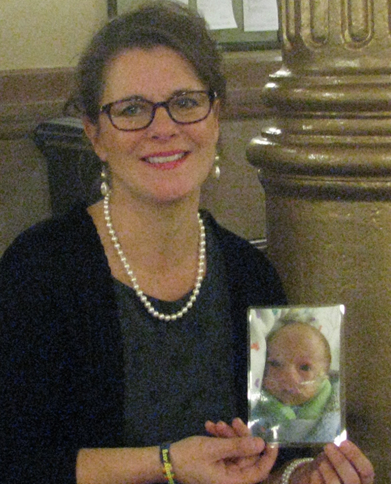
By MEGAN HART
Sheryl Crosier only found out after her infant son had died that he had a “do not resuscitate” order — a measure she said she and her husband never would have agreed to. Crosier, who is from the St. Louis area, spoke Thursday to the Senate Public Health and Welfare Committee in support of Senate Bill 437, also known as Simon’s Law.
It would forbid health care facilities or providers from withholding “life-sustaining procedures, food, medication or nutrition” from any patient younger than 18 without written permission from one of the patient’s parents or a legal guardian.
“When Simon’s oxygen levels began to fall, we were told it was the end and we could do nothing,” she said. “If somebody in this audience was struggling to breathe, how many of you would stand here and do nothing?”
A similar bill was introduced in Missouri but has yet to receive a hearing.
Crosier said she and her husband wanted to do everything medically possible for their son Simon, who was born in September 2010 and diagnosed with Trisomy 18 after three days.
Trisomy 18 often causes problems with the heart and other organs, as well as developmental delays, though the effects can vary widely. According to the Trisomy 18 Foundation, about 10 percent of children with the condition survive their first year of life. Some live into adulthood, however.
After Simon was diagnosed, the hospital turned off his heart monitor and only provided “comfort feedings”— minimal nutrition typically used with dementia patients — which the Crosiers didn’t find out about until after his death. “Someone decided our son’s life didn’t have any value,” she said.
The one-page bill would require doctors and facilities to provide patients with a copy of any policies they have regarding life-sustaining treatment or treatments not deemed to be beneficial.
A physician also couldn’t institute a do-not-resuscitate order without permission from at least one of the patient’s parents or a guardian.
Kathy Ostrowski, legislative director of Kansans for Life, testified in favor of the bill but suggested some amendments. The amended language would allow providers to withhold treatments if “reasonable medical judgment” dictated withholding the treatment wouldn’t hasten the patient’s death or if providing the treatment would create a greater risk to the patient than withholding it.
Ostrowski said children with disabilities were more likely to be denied medical interventions, even if their parents wanted them, and the bill would prevent doctors from making “value judgments” about treatment. No one testified in opposition to the bill.
The American Medical Association’s Code of Ethics says that physicians should consult with the patient, or his or her representative, before making decisions regarding life-sustaining treatment.
Megan Hart is a reporter for KHI News Service in Topeka, a partner in the Heartland Health Monitor team. You can reach her on Twitter @meganhartMC
